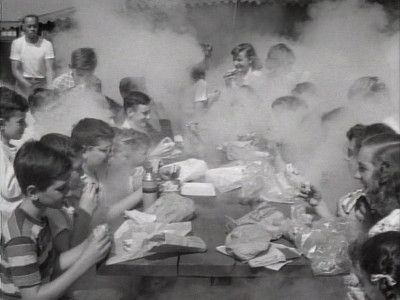

American Experience
Season 5
TV-PG
"American Experience" combines dramatic re-enactments with commentary by historians and authors to present an absorbing look at the personalities, events and resources that have had a profound impact on the shaping of America's past and present.
Where to Watch Season 5
13 Episodes
- The Kennedys (1): The Father, 1900-61E1
The Kennedys (1): The Father, 1900-61No family has had such a powerful hold on the American imagination. A saga of ambition, wealth, family loyalty and personal tragedy, the Kennedy story is unlike any other. From Joseph Kennedy's rise on Wall Street and frustrations in politics, through John Kennedy's march to the presidency -- orchestrated by his father - -to Edward Kennedy's withdrawal from the 1980 presidential race following the scandal of Chappaquidick, the family has left a legacy that continues to influence politics today. - The Kennedys (2): The Sons, 1961-80E2
The Kennedys (2): The Sons, 1961-80No family has had such a powerful hold on the American imagination. A saga of ambition, wealth, family loyalty and personal tragedy, the Kennedy story is unlike any other. From Joseph Kennedy's rise on Wall Street and frustrations in politics, through John Kennedy's march to the presidency -- orchestrated by his father - -to Edward Kennedy's withdrawal from the 1980 presidential race following the scandal of Chappaquidick, the family has left a legacy that continues to influence politics today. - The Donner Party
 E3
E3The Donner PartyOf all the 19th century pioneer stories, none exerts so powerful a hold on the American imagination as this, during the worst winter ever recorded in the High Sierras. In June, 1846, 87 men, women and children began their legendary 2,000 mile journey from Illinois to California. They packed huge wagons, took food, hired servants. When family leaders made the fateful decision to take an untried short cut to beat the coming winter, only half would come out alive. - Liberators: Fighting on Two Fronts in World War IIE4
Liberators: Fighting on Two Fronts in World War IIThey were African-American soldiers. They were inducted into a rigidly segregated army. They trained in white America. Their commanders never intended to send them into battle, and yet African-American soldiers fought through six European countries into the heart of the most violently racist empire the world has ever known. The victims of nazi terror would never forget them. - George Washington: The Man Who Wouldn't Be King
 E5
E5George Washington: The Man Who Wouldn't Be KingThe personal development of George Washington is the focus as Producer David Sutherland brings to life a uniquely human Washington who transformed himself from social climber into a patriot willing to give up everything for a higher cause. - Last Stand at Little Big Horn
 E6
E6Last Stand at Little Big HornIn 1876, when the U.S. Army planned its biggest Indian campaign yet against Sitting Bull and Crazy Horse, General George Custer led the chase. Custer and his 210 men were surprised and surrounded, the result of arrogance, bad planning and bad intelligence. The battle took "about as much time as it takes a hungry man to eat dinner," leaving no white survivors. One of the most frequently depicted and least understood moments in American history, the story is told from both sides. - If You Knew SousaE7
If You Knew SousaJohn Phillip Sousa became America's favorite bandmaster, but band music wasn't Sousa's only passion. He was the first to bring the classics -- Verdi, Wagner, Puccini -- to a burgeoning American middle class. Wildly popular, his was the first large musical organization to go on tour and make music pay. He helped give birth to that great American institution, the small town marching band. - Simple JusticeE8
Simple JusticeThirty years after the Supreme Court's "separate but equal" ruling, lawyer Charles Hamilton took over Howard University's rundown, segregated law school with the idea of training a cadre of elite African American lawyers to legally eradicate segregation, case by case, state by state. Their relentless and dangerous struggle would yield victory in the Supreme Court's landmark ruling, Brown v. Board of Education in 1954. A dramatic presentation. - Knute Rockne and His Fighting IrishE9
Knute Rockne and His Fighting IrishWhen he died in 1931 in a plane crash on his way to Hollywood to sign a film contract, the President called it a "national loss." The funeral was broadcast live on CBS Radio to Europe, South America and Asia. As Notre Dame's football coach, Knute Rockne galvanized attention to his "Fighting Irish" and was a pivotal figure in the sudden rise of sports to a position of enormous power in American life. - Sit Down And FightE10
Sit Down And FightIn 1936, Walter Reuther led one of the bitterest, bloodiest battles ever fought in the history of the American labor movement. By sitting down and stopping the machinery of factory production, auto workers forced the Big Three to recognize their union. GM tried turning off the heat and blocking food deliveries and Ford sent members of their private security force to beat up UAW officials, but workers stood their ground. - Rachel Carson's Silent Spring
 E11
E11Rachel Carson's Silent SpringShe had been a biologist for the federal government when she first took note of the effects of the unregulated use of pesticides and herbicides, especially DDT. Magazines refused to publish her articles because they were afraid of losing advertising. When Rachel Carson published Silent Spring in 1963, she was viciously attacked, called "an ignorant and hysterical woman." But her warning sparked a revolution in environmental policy and created a new ecological consciousness. - Goin' Back to T-Town
 E12
E12Goin' Back to T-TownIn Tulsa, the community of Greenwood was a place where blacks had some measure of financial, social and political independence. Burned to the ground in 1921 by angry whites, Greenwood was rebuilt and boasted the largest concentration of black businesses in the country. In a nostalgic celebration of old fashioned neighborhood life, the black residents of "T-Town" relive their community's remarkable rise and ultimate decline. - Ishi: The Last Yahi IndianE20
Ishi: The Last Yahi IndianWhen "Ishi," the last surviving member of a small Indian tribe, walked into the small California town of Oroville in 1911, he became a media curiosity and scientific "specimen." The San Francisco Museum built a Yahi house where audiences could watch Ishi make arrowheads and shoot bows. Ishi went to the theater and received invitations of marriage. But contact would bring him terrible physical and psychological consequences.